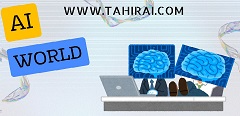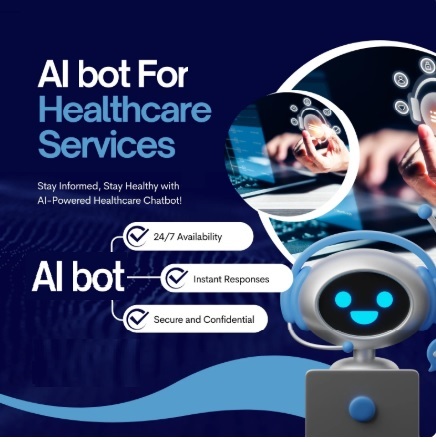Artificial Intelligence (AI) is making significant strides in transforming healthcare, offering groundbreaking solutions that promise to enhance patient outcomes, streamline medical processes, and improve accessibility to care. With its ability to analyze vast amounts of data, identify patterns, and provide actionable insights, AI is becoming a key player in the evolution of modern medicine. From diagnosis to treatment planning, AI is reshaping how healthcare professionals deliver care and how patients experience it.
In this article, we explore the latest advancements in AI within the healthcare industry and the ways in which these innovations are revolutionizing the medical field.
What Is AI in Healthcare?
Auto-Refreshing 50-Frame Viewer
Next update in: 60 seconds
AI in healthcare refers to the use of artificial intelligence technologies—such as machine learning (ML), natural language processing (NLP), deep learning, and computer vision—to solve complex medical problems. These technologies enable machines to simulate human intelligence, analyze medical data, and assist healthcare providers in making faster and more accurate decisions.
AI applications in healthcare span a variety of areas, including diagnostic tools, treatment recommendations, drug discovery, patient care, and administrative processes. By enhancing the efficiency and accuracy of healthcare services, AI holds the potential to reduce costs, improve outcomes, and increase access to quality care worldwide.
Key AI Advancements in Healthcare
- AI for Medical Diagnostics
AI is increasingly being used to assist in diagnosing diseases with greater speed and accuracy than ever before. Machine learning algorithms can process large volumes of medical data, such as medical images and patient records, to identify patterns and detect abnormalities that may be overlooked by human doctors. Some key areas where AI is making a significant impact include:
- Medical Imaging and Radiology: AI is revolutionizing the field of medical imaging by enabling faster and more accurate interpretation of radiographs, MRIs, and CT scans. Deep learning algorithms can analyze medical images to detect conditions like tumors, fractures, and diseases such as pneumonia, often with greater precision than human radiologists. For example, AI has shown remarkable success in identifying early signs of breast cancer, lung cancer, and neurological disorders.
- Pathology: In pathology, AI-driven tools help pathologists analyze tissue samples and detect cancerous cells more efficiently. By automating time-consuming tasks like counting cells and analyzing biopsy samples, AI can help pathologists make more accurate diagnoses and reduce human error.
- Genetic Data Analysis: AI technologies are increasingly used to analyze genetic data, helping to identify genetic markers for diseases and personalized treatment plans. By leveraging large datasets of genetic information, AI can predict a patient’s risk for certain conditions, such as hereditary cancers or cardiovascular diseases.
- AI for Personalized Treatment and Precision Medicine
One of the most promising aspects of AI in healthcare is its ability to support personalized medicine. Traditional treatments often follow a “one-size-fits-all” approach, which may not work for all patients. AI enables healthcare providers to tailor treatments based on an individual’s genetic profile, medical history, lifestyle, and other personal factors.
AI algorithms analyze vast amounts of patient data, including genetic information, clinical histories, and real-time monitoring data from wearable devices, to suggest personalized treatment plans. These treatments can be more effective because they are based on specific characteristics of the patient rather than generalized assumptions.
For example, AI is being used to personalize cancer treatment by identifying specific genetic mutations in tumors and recommending targeted therapies that are more likely to be effective. In cardiology, AI can analyze data from heart monitoring devices to identify personalized strategies for managing chronic conditions like hypertension or arrhythmia.
- Drug Discovery and Development
The process of developing new drugs is time-consuming, expensive, and often inefficient. AI is transforming drug discovery by speeding up the research process and increasing the likelihood of identifying promising drug candidates.
- Drug Design: AI algorithms can analyze biological data and simulate molecular interactions to design potential drug molecules. This accelerates the discovery of new therapies and helps researchers focus on the most promising candidates early in the process.
- Predicting Drug Efficacy: Machine learning models are used to predict the efficacy and safety of drug candidates by analyzing data from clinical trials, laboratory experiments, and patient populations. This can reduce the time and cost required to bring new drugs to market.
- Repurposing Existing Drugs: AI is also being used to identify new uses for existing drugs. By analyzing large datasets of medical literature and clinical trial results, AI can uncover potential new applications for drugs that have already been approved for use in treating other conditions.
- Virtual Health Assistants and Chatbots
AI-powered virtual assistants and chatbots are transforming how patients access healthcare information and services. These AI systems can provide 24/7 support for basic medical inquiries, appointment scheduling, and medication reminders, improving patient engagement and reducing the burden on healthcare providers.
- Symptom Checkers: AI-based symptom checkers allow patients to input their symptoms and receive preliminary diagnostic advice. While these tools are not intended to replace doctors, they can help guide patients to appropriate care, offer reassurance, and reduce unnecessary visits to emergency rooms.
- Medication Management: Virtual assistants can help patients manage their medications by providing reminders, offering dosage instructions, and tracking prescription refills. These tools also allow patients to ask questions about their medications, potential side effects, and interactions.
- Telemedicine: AI is playing a critical role in expanding access to healthcare through telemedicine platforms. Virtual consultations powered by AI can assist in preliminary diagnosis, offer treatment advice, and monitor patients remotely, especially in underserved or rural areas.
- AI in Healthcare Administration
AI is also streamlining administrative tasks within healthcare systems, improving efficiency and reducing operational costs. Key administrative applications of AI include:
- Electronic Health Record (EHR) Management: AI tools can automatically organize and analyze patient data from electronic health records, reducing the time doctors and nurses spend on documentation. This allows healthcare providers to spend more time with patients and less time on administrative tasks.
- Predictive Analytics: AI is used to predict patient outcomes, readmission rates, and potential complications, enabling healthcare systems to allocate resources more effectively. Predictive models help hospitals and clinics plan for high-demand periods, improving patient flow and reducing wait times.
- Fraud Detection: AI can help detect fraudulent activities in billing and insurance claims by analyzing patterns and anomalies in healthcare transactions. This reduces the incidence of fraudulent practices and ensures that resources are used efficiently.
The Benefits of AI in Healthcare
- Improved Accuracy: AI’s ability to analyze vast amounts of data with precision allows for more accurate diagnoses, reducing human error and leading to better treatment outcomes.
- Cost Reduction: By automating administrative tasks, streamlining drug discovery, and improving the efficiency of medical procedures, AI can significantly reduce healthcare costs in the long run.
- Access to Care: AI-powered virtual assistants, telemedicine platforms, and remote monitoring tools make healthcare more accessible, particularly in rural and underserved areas where medical professionals may be scarce.
- Faster Treatment: AI accelerates the development of new drugs, identifies personalized treatment plans, and helps doctors make quicker, data-driven decisions, resulting in faster treatment for patients.
Challenges and Ethical Considerations
While AI has immense potential in healthcare, its widespread adoption comes with challenges:
- Data Privacy: The use of AI in healthcare requires access to large amounts of sensitive patient data. Ensuring the privacy and security of this data is paramount to maintaining patient trust and complying with regulatory standards.
- Bias and Fairness: AI models can inherit biases from the data they are trained on, leading to potential inequities in healthcare outcomes. It is crucial to ensure that AI systems are developed and tested with diverse, representative datasets to avoid reinforcing existing health disparities.
- Regulation and Accountability: As AI systems take on more decision-making roles in healthcare, establishing clear regulatory frameworks and accountability measures will be essential to ensure that AI technologies are safe, effective, and ethically deployed.
The Future of AI in Healthcare
The potential for AI to transform healthcare is vast, and the future is bright. As AI technologies continue to evolve, we can expect even more groundbreaking advancements in personalized medicine, diagnostics, and treatment options. AI will continue to enhance patient outcomes, improve efficiency, and reduce costs while making healthcare more accessible and equitable.
In the coming years, AI’s role in healthcare will only grow, offering new opportunities for innovation and better care for all. With the right safeguards in place, AI has the power to revolutionize healthcare and fundamentally change how we approach medicine.



